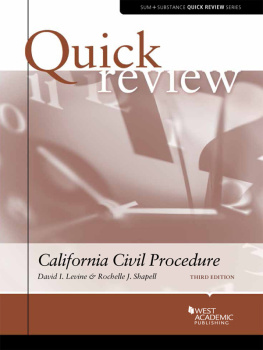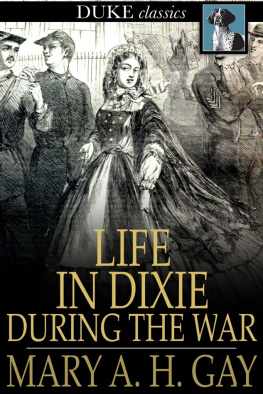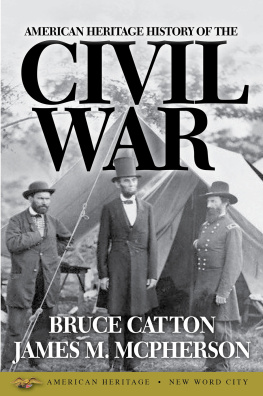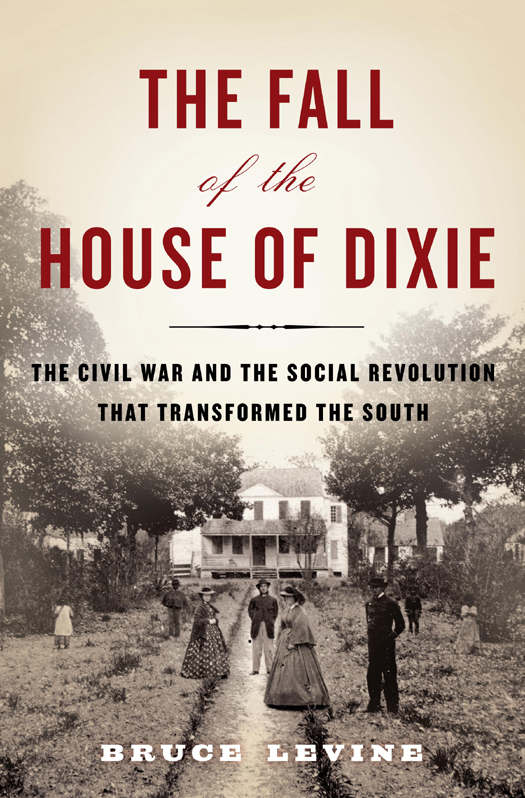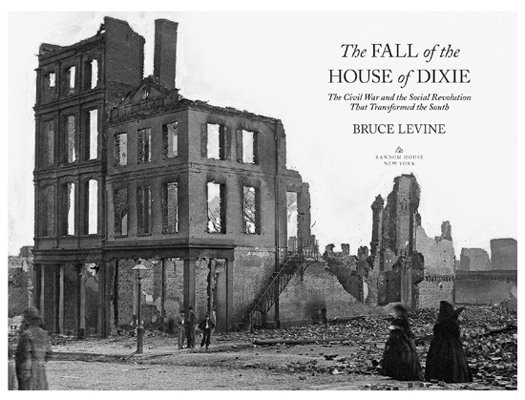Copyright 2013 by Bruce Levine
Maps copyright 2013 by David Lindroth, Inc.
All rights reserved.
Published in the United States by Random House,
an imprint of The Random House Publishing Group,
a division of Random House, Inc., New York.
R ANDOM H OUSE and colophon are registered trademarks of Random House, Inc.
Library of Congress Cataloging-in-Publication Data
Levine, Bruce
The fall of the house of Dixie : the Civil War and the
social revolution that transformed the South /
Bruce Levine.
p. cm
eISBN: 978-0-679-64535-1
1. Confederate States of America. 2. Confederate States of AmericaSocial conditions. 3. Confederate States of AmericaEconomic conditions. 4. SlaverySocial aspectsSouthern StatesHistory19th century. 5. SlaveryEconomic aspectsSouthern StatesHistory19th century. 6. Elite (Social sciences)Southern StatesHistory19th century. 7. United StatesHistoryCivil War, 18611865Social aspects. 8. United StatesHistoryCivil War, 18611865Economic aspects. I. Title.
E487.L494 2013
973.713dc23 2011048310
www.atrandom.com
Title-page illustration: View of ruins, Richmond, from Main Street, looking down Fourteenth Street, April 8, 1865 (The Library of Congress)
Jacket design: Christopher Sergio
Jacket photograph: Smiths (Old Fort) Plantation,
Port Royal Island, S.C., under Union army occupation during the Civil War (Massachusetts Commandery, Military Order of the Loyal Legion of the United States/U.S. Army Military History Institute)
v3.1
Decades after the Civil War ended, Katherine Stone recalled the gay, busy life she had led at Brokenburn, her familys 1,200-acre plantation in prewar Louisiana. There was always something going onformal dining, informal spend the days, evening parties, riding frolics, fox hunts. To make these and other diversions possible, Katherine remembered, her family had quite a corps of servants to keep us well waited on, since naturally no one expected to wait on himself. Each of Katherines young brothers also owned a little darkie in the quarters who would eventually become his body servant. And some 150 other slaves toiled in Brokenburns cotton and sugarcane fields, six days out of seven, week after week, month after month, year after year, generating the wealth that sustained the Stone familys life of luxurious ease.
The wars outbreak in April 1861 augured the end of the Stone familys complacent idyll. The fighting between North and South, Katherine soon perceived, had infected her slaves with hope for a radical change in their condition. Some were becoming lazy and disobedient and giving a lot of trouble generally. One evening, as the Stones took the night air on the gallery of their plantation home, a runaway Negro darted past them. Though Katherines brothers leaped to the pursuit, the desperate fugitive made good his escape. She and her neighbors began to worry that they were living on a mine.
Seeking refuge from such anxieties, Katherine turned to the works of a popular southern authorEdgar Allan Poe. With her nerves already frayed, however, she decided to avoid his most fearsome pieces. Perhaps she chose The Fall of the House of Usher. Neither grisly nor filled with supernatural horrors, it might well have seemed a relatively safe distraction from the unsettling events of the day.
As that story begins, Poes narrator pays a visit to an old friend, Roderick Usher, the scion of a very ancient family and current master of its imposing mansion. At first glance, the massive edifice gave little token of instability. But its seeming solidity conceals a barely perceptible fissure which, extending from the roof of the building in front, made its way down the wall in a zig-zag direction, until it became lost in the foundation and the lake adjacent to it. After a while, the mansions hidden structural fault begins to announce itself, at first in a muffled reverberation, then in a mounting roar and powerful shudder. Finally, as the visitor watches in shock, that once barely discernible fissure gapes dramatically open, the walls tumble, and the august mansion collapses, burying its owner under the rubble. The surrounding lakes waters then close sullenly and silently over the fragments of the House of Usher.
If Katherine Stone did choose to read this tale, it could hardly have offered her much comfort. She, too, resided in an imposing and outwardly sturdy structurethe House of Dixie, the slavery-based society of the American South. And hers, too, was already beginning to display deep fissures running through it. As the Civil War continued, those fissures would widen until the whole structure fell.
Contents

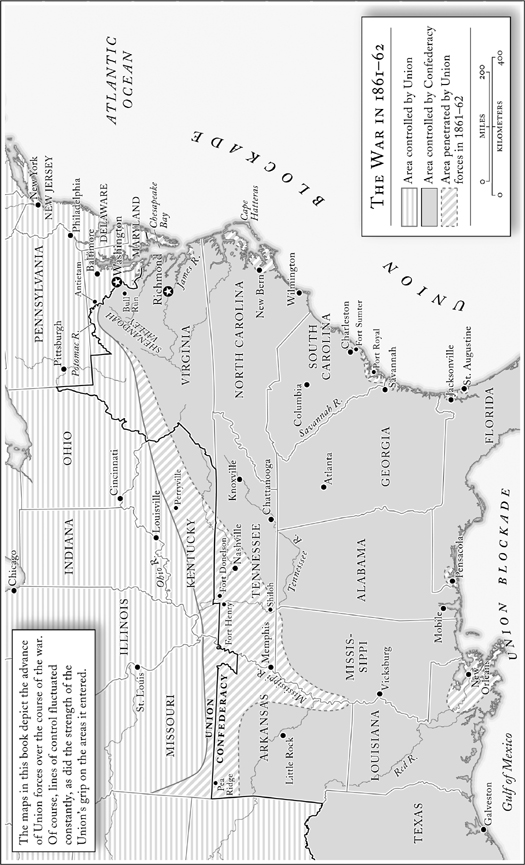
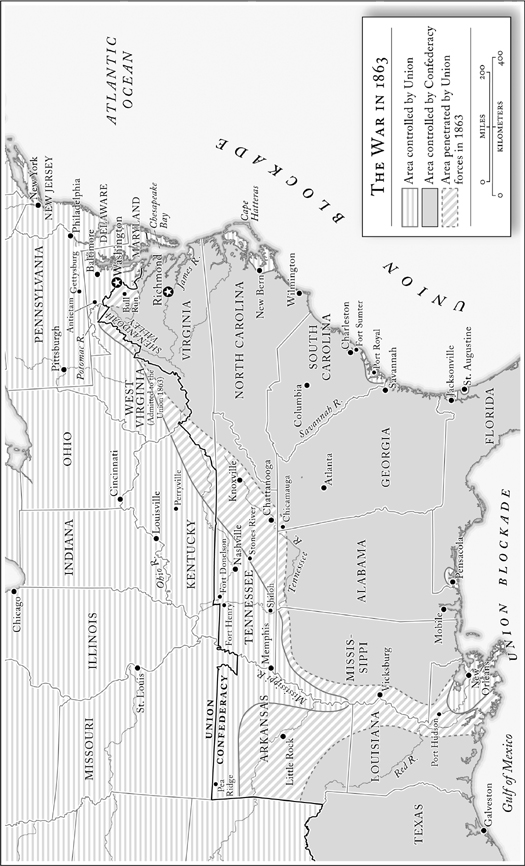
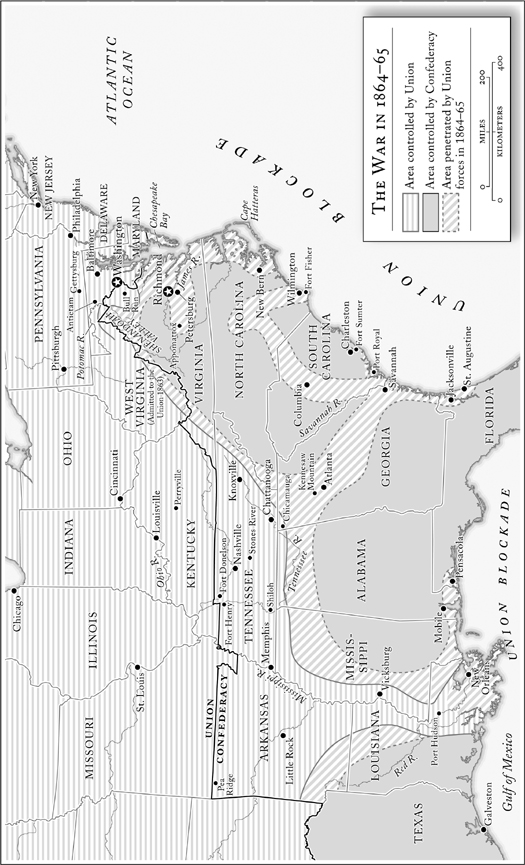
Introduction

In the middle of the nineteenth century, southern writers and politicians boasted oftenand with considerable justificationthat their states were the richest, most socially stable, and most politically powerful in the United States as a whole. Southern farms and plantations yielded handsome profits to their owners, who were some of the wealthiest people in the country, and the southern elite had controlled all three branches of the federal government during most of its existence. At the root of all this economic and political power lay the institution of slaveryan institution that, as the former slave Frederick Douglass would later recall, then seemed impregnable. Few could then have imagined, he noted, that in less than ten years from that time, no master would wield a lash and no slave would clank a chain in the United States.
But what almost no one foresaw in 1860 is exactly what came to pass. In Mark Twains words, the Civil War and its aftermath uprooted institutions that were centuries old, changed the politics of a people, transformed the social life of half the country. The most important and dramatic of these transformations was the radical destruction of slavery. About one out of every three people in the South suddenly emerged from bondage into freedom, a change of such enormous significance and full of so many implications as almost to defy description.
For the Souths ruling families, meanwhile, the war turned the world upside down. It stripped them of their privileged status and their most valuable property. It deprived them of the totalitarian power they had previously wielded over the men, women, and children who produced most of the Souths great wealth. The events of the last five years, a Memphis newspaper editor summarized in 1865, have produced an entire revolution in the entire Southern country. The old arrangement


